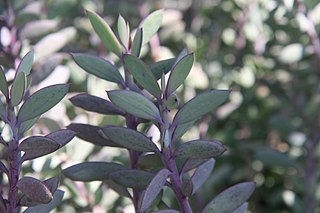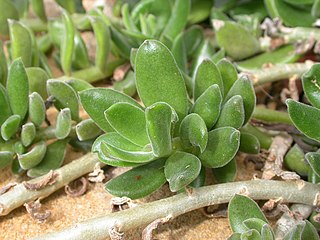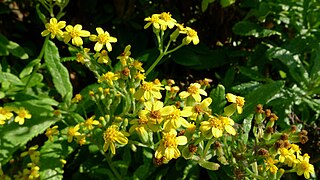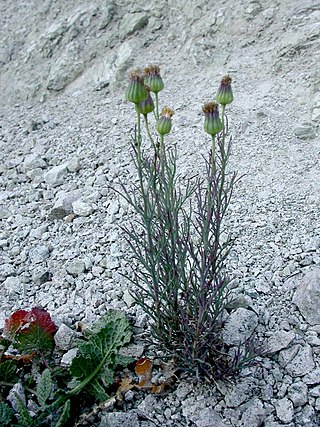
Ceropegia woodii is a flowering plant in the dogbane family Apocynaceae, native to South Africa, Eswatini and Zimbabwe. It is sometimes treated as a subspecies of the related Ceropegia linearis, as C. linearis subsp. woodii. Common names include chain of hearts, collar of hearts, string of hearts, rosary vine, hearts-on-a-string, and sweetheart vine.

Encephalartos woodii, Wood's cycad, is a rare cycad in the genus Encephalartos, and is endemic to the oNgoye Forest of KwaZulu-Natal, South Africa. It is one of the rarest plants in the world, being extinct in the wild with all specimens being clones of the type. The specific and common name both honour John Medley Wood, curator of the Durban Botanic Garden and director of the Natal Government Herbarium of South Africa, who discovered the plant in 1895.

Delairea is a genus of flowering plants within the family Asteraceae. Currently, it only features two species: Delairea odorata from Southern Africa, and the recently discovered Delairea aparadensis from Southern Brazil, which is critically endangered. D. odorata formerly belonged to the genus Senecio as Senecio mikanioides.

Senecio vernalis is one of the European species of Senecio, an annual that is also known as eastern groundsel. While it has been long classified as Senecio vernalis, this species has more recently been described as a subspecies of Senecio leucanthemifolius and is now included by some in that species.

Senecio glaucus is an annual member of the Asteraceae and species of the genus Senecio. It is found from the western Mediterranean to Central Asia in sandy, well-drained soil, particularly coastal and desert dunes.
Senecio transmarinus is a sometimes straggling member of the flowering plants Asteraceae and species of the genus Senecio a perennial herb that grows on the higher elevations of the Rwenzori Mountains in Uganda. It is also found in Rwanda and the Democratic Republic of the Congo. The inflorescences consist of several flowerheads with large yellow ray florets.

Senecio adenotrichius is a species of the genus Senecio. It is native to Chile, and common on disturbed land there.

Senecio crassissimus, the propeller plant, vertical leaf or lavender steps, is a succulent species of flowering plant in the daisy family Asteraceae, and is endemic to the island of Madagascar off the east coast of Africa.

Curio ficoides, syn. Senecio ficoides, also known as skyscraper senecio, Mount Everest senecio or flat-leaved senecio, is a species of succulent plant, in the genus Curio (Asteraceae), indigenous to South Africa.

Senecio fistulosus is a species of the genus Senecio, family Asteraceae and one of the many species of Senecio native to Chile.

Senecio fremontii, the dwarf mountain ragwort, is a species of the family Asteraceae. It takes its scientific name from John C. Frémont.

Kleinia implexa is a species of flowering plant in the genus Kleinia and family Asteraceae which was previously considered to be a species of Senecio.

Kleinia petraea is a species of flowering plant in the genus Kleinia and family Asteraceae which was previously considered to be a species of Senecio. Native to Kenya and Tanzania, it is colloquially known as creeping jade, trailing jade or weeping jade due to its resemblance to the unrelated Jade plant.

Senecio madagascariensis, also known as Madagascar ragwort, is a species of the genus Senecio and family Asteraceae that is native to Southern Africa. Other common names include Madagascar groundsel and fireweed. It has been included on the noxious weeds list for Hawaii and the reject list for Australia. S.madagascariensis is the diploid cytotype of S.inaequidens.

Senecio nevadensis is a species of flowering plant in the family Asteraceae.

Senecio viscosissimus is a species of flowering plant in the genus Senecio and family Asteraceae.

Senecio tripinnatifidus is a species of the genus Senecio and family Asteraceae and is a native of Chile.

Curio archeri, syn. Senecio toxotis is a species of succulent plant in the family Asteraceae that is indigenous to the south-western Cape, South Africa.

The Durban Botanic Gardens is situated in the city of Durban, KwaZulu-Natal, South Africa. It is Durban's oldest public institution and Africa's oldest surviving botanical gardens. The gardens cover an area of 15 hectares in a subtropical climate.

Caputia is a small genus of flowering plants in the family Asteraceae, native to South Africa. It may be of hybrid origin. Species in this genus were formerly considered part of the genus Senecio.



















